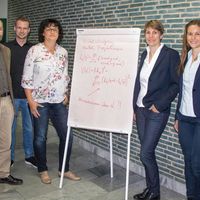In a project by the universities of applied sciences in Aachen and the German Sport University Cologne, Prof. Dr. Kirsten Albracht, together with Benjamin Stäudle and Charlotte Richter, are investigating changes in muscle function caused by long-term stays in weightlessness and the way muscles work when running on a vertical treadmill used to simulate running training on the International Space Station. In order to precisely analyze the functioning of the muscles, ultrasound is used to visualize and measure the fiber bundles of the muscles during contraction.
Because the manual evaluation of the ultrasound measurements is very time-consuming, Prof. Albracht approached Prof. Dr. Regina Pohle-Fröhlich from the Institute of Pattern Recognition (iPattern) at The Hochschule Niederrhein to see if she could develop an algorithm to automatically evaluate the data. Prof. Pohle-Fröhlich is an expert in the field of image analysis.
Together with Prof. Dr. Christoph Dalitz and Master's student Jakob Görner, she spent six months developing a robust algorithm to estimate the angle and length of muscle fibers from the video data. "Such practical orientation projects are not just an opportunity for us to apply our specialist knowledge. The specific practical requirements also require extensive research in the scientific literature and we also learn from this. In this case, we came across methods for robust non-parametric regression that enabled us to significantly improve the measurement results," says Prof. Pohle-Fröhlich.
On April 17, the iPattern team presented the results to their client from the universities of applied sciences in Aachen and handed over the software developed in the project. Student Jakob Görner played a key role in the development of the platform-independent user interface. The project was a valuable experience for him: "I was able to directly experience the practical benefits of the pattern recognition methods covered in my Master's degree in Computer Science."
The algorithm will help to evaluate the measurement results in an appealing way in the ongoing project between FH Aachen and Cologne Sport University.


















